Deploying technology enabled property listing solutions to aggregate, validate, and enhance real estate database significantly improves performance of property listing sites across real estate marketplaces.
Voluminous property information with dissimilar transactional details and multiple attributes flood property listing sites every minute. Keeping this data clean and accurate is a challenge confronting many real estate aggregators.
49% of real estate companies are of the view that accurate property information significantly affects their business decisions, says KPMG. For them, profitable growth and high user experience is possible only when they have all-inclusive, accurate & up-to-date property listings.
Structured workflows, multi-layered validation checks, agile processes and deployment of tools and technology go a long way to ensuring a comprehensive and hygienic property database. Let’s dive deep into understanding the most common property listing issues and their solutions.
Top 5 property listing challenges and solutions
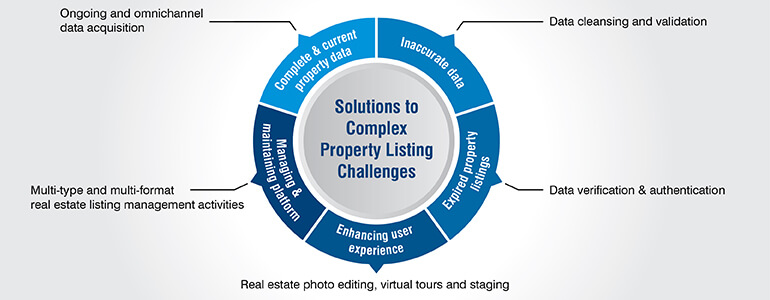
Challenge #1 – Ensuring all-inclusive property listing data
Maintaining an adequate number of property listings is not always easy. Especially, when you are operating at a global level, you have to acquire property listing data from multiple stakeholders/data sources. These sources include real estate data aggregators, small and medium MLS sites, and third-party structured/non-standard data sources.
Solution: Concurrent data collection / data acquisition
The best way to deal with the problem of collecting/extracting data from diverse data sources is to follow a concurrent data collection strategy. It combines multiple methods, each of which works effectively in their respective scenarios and helps extract data efficiently.
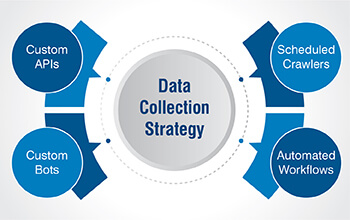
Some practical solutions to data collection challenges include:
Custom APIs: Custom APIs are used to collect data from the back-ends of online sources. Data from websites, online surveys, social media platforms and other sources can be easily extracted for analysis with these APIs. Whether it is data on audience sentiment, or demographic data, or anything in between, custom APIs help in hassle-free data collection and categorization.
Custom bots and scheduled crawlers: Customized bots and scheduled crawlers give you insights into real-time intelligence about competition, property value, pricing data, property images, agent data, etc. They also help to convert unstructured data into a structured format, giving you ready access to desired information points.
Scheduled bots and crawlers were used to collect data from 1,350+ Multi-listing sites at regular intervals. It helped the real estate listing site to have comprehensive database of residential and commercial properties, increase client satisfaction & improve brand credibility.
Process workflows for keying in and indexing of real estate information: Robust and agile workflows reduced the efforts of getting access to concurrent property price indices, mortgage rates, financial indicators, etc. Populating databases with complex-to-calculate metrics becomes robust and agile with help of automated data workflows
Challenge #2 – Bad or incorrect data
Inaccurate, irrelevant, inconsistent, and incomplete data, termed as bad data, is a major concern. It includes incorrect contact information, wrong classification or categorization of property, duplicate pictures or incorrect or manipulative property pictures.
Dealing with bad data demands extreme caution. Some causes of bad data include posting in incorrect categories, not keeping a track of duplicate real estate listings, writing unethical descriptions, using poor images, etc.
Solution: Data cleansing and validation
Rather than tracking every likely course of bad data, following a standard data hygiene process is much easier. A quality data validation routine implements multiple checks to ensure data validity and helps you maintain a fresh and accurate database.
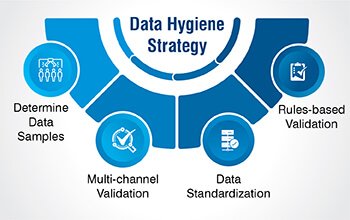
Let’s have a look at data hygiene and validation best practices:
Input and determine data samples: Driving sampling-based data validation gives a systematic direction to preventing entry of bad data. The enormity of data volumes doesn’t allow easy mass-scale validation. So, first dividing the data into samples and then applying validation stands a better option. You can process samples of data in real-time to hasten the process.
Multi-channel validation: Working as a cross-validation strategy, this approach helps you to validate the uniqueness of contact information, property characteristics, owner details, legal aspects, etc. A US-based real estate listing site leveraged multi-channel quality control and audit framework to validate 650,000+ records every month to improve the customer experience.
Rules-based validation and formatting: Complex inter-linkages among property data attributes like wrong classification or categorization of the property necessitates rule-based validation. While validating data elements, rules help classify property into distinct categories based on its age, value, and condition. Working as IF/Then statements, rules ascertain that each field has the most relevant value.
Challenge #3 – Dead & expired property listings
As property data continues to pour in, the size of your real estate listings database continues to grow. However, identifying a point where a listing becomes outdated is a difficult task. How soon a listing expires, again depends on multiple factors, which require you to regularly consider elements like timeframe, seller action, etc.
Solution: List verification and authentication
Real estate listings, though time-sensitive, are not subject to expiry according to a fixed duration. Your property listing may expire in just 70 days or even remain active for 3 years. Rather than losing your time over examining expiry factors, keep your list constantly updated and authenticated.
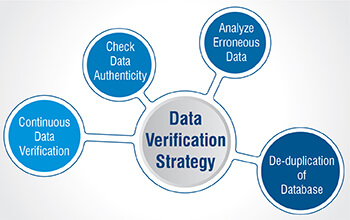
The solution here is continuous verification of property records:
Continuously verify database: A schedule-based approach is best for quality inspection. HabileData deploys a continuous verification mechanism where real estate data is verified against a checklist. This includes verifying the property status, checking if a listing has been withdrawn, and ascertaining if there is a need to relist a property, etc.
Building and maintaining a comprehensive, standardized and high-performing database increased performance of UK-based MLS site driving higher business revenues. Automated tools were used to standardize, cleanse and remove duplicates.
Analyze and dedupe data: Duplicate data severely hampers the authenticity of property data. Deduplication is indispensable when maintaining records of the millions of attributes of houses, condominiums, and flats in a database. With the rise in listing data volumes, real estate listing management solution providers have transitioned from manual to ML-based auto deduplication. This ensures that real estate marketplaces get quality and authenticated listings.
Check authenticity: To ensure that we populate real estate listing sites with accurate data, HabileData employs multi-factor authentication processes. They work as filters to certify the data as authentic before it enters the database.
Challenge #4: Meeting online buyer expectation
Online consumers want a streamlined experience, and you need to offer them the best-in-class experience on your MLS platform. While ensuring convenient mobility across the selling platform, ensure all of your impression-creating activities, visualization plus data, meets quality.
Solution: Real estate photo editing, virtual tours and staging
Visual effects are the direct determinants of your MLS platform’s performance. Adopting to real estate image editing, retouching trends allows you to meet customer expectations. Opening new avenues for setting long-term impressions, techno-creative approaches like virtual tours and staging hold the answer.
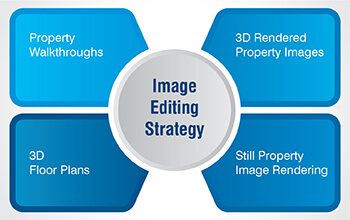
Let’s explore some real estate image editing best practices:
Edited property photos and video walkthroughs: May it be property distortion correction, sky replacement, color correction, furniture effect tweaking, or brightness and contrast improvement; a series of real estate image editing techniques help you build ideal property image portfolios.
Automated workflow for post processing 3,500+ HD quality property images resulted in huge cost savings for a real estate photography company. HDR quality of real estate images in their catalogs enhanced their brand value. Since HabileData knows that image editing alone doesn’t suffice, we give a powerful impetus to building walkthrough videos that give viewers access to the minutest property details.
3D rendered property descriptions: A graphically appealing 3D view of your property that gives a 360-degree tour of your property gives a lifelike experience to buyers. Right from setting the time of the day to adjusting views, you can play with the features to generate virtual but realistic property graphics.
3D floor plans and still image rendering: Offering a bird’s-eye view of your house takes you one step closer to selling it. 3D floor plans help you accomplish this. Apart from just explaining the layout, they throw light on the architectural technicalities. 3D renderings are crucial in the online buyer landscape, where people want to make well-informed decisions fast.
Challenge #5 – Property list management and platform maintenance
Ever-soaring volumes of property lists enriched by textual data and multimedia graphics-images and videos, calls for robust list management and maintenance. An off-the-shelf platform resolves your issues, but only by offering a generic structure. Identification, implementation, and successful execution of the right steps only convert it into a customized platform.
Solution: Multi-type and multi-format real estate listing management activities
Diversity of data and formats creates complexities for property listing sites. To overcome these issues, they should adopt a robust and agile data management workflow. Having separate data framework each for text, image, and video data is a smart move. End-to-end automated property listing solutions help multiple listing sites provide superior member services.
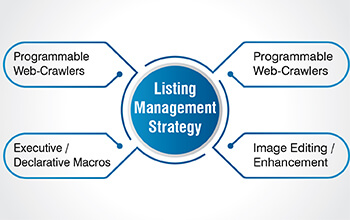
Automated property listing solutions for real estate marketplaces include:
Programmable web crawlers: To scrape and aggregate property data across time zones in real time empowers real estate property listing sites and marketplaces in providing comprehensive, accurate and up-to-date data to their end customers.
Scripts and macros: Robust data cleansing and enrichment ensures quality real estate data and rich dashboards on property listing sites to attract broker subscribers, other MLS sites, real estate portals, etc. from across real estate marketplaces.
Image editing and enhancement: It forms an integral part of property listing management solutions. The fine blend of property information and enhanced property images helps MLS to have a comprehensive view of all properties in the market- including current and past listings.
Process automation and innovation is the future of property listing management
While technology has already started dictating property listing performance and how to manage it, complete automation will engineer a highly streamlined process. So, structural diversity, navigation complexities, or even maintenance overhead won’t bother you anymore.
What does smart technology entail?
- You will have models well trained and tested to automatically extract data from the internet.
- Auto-incremental model training saves you from cumbersome model updating process.
- Auto monitoring and extraction of millions of property records, enabling bulk output of equivalent listings in seconds.
- Ability to tap into thousands of web pages for data extraction at once.
- Real-time competitor intelligence turns enormous data into insights just in seconds.
- Remarkable improvement in listing processing efficiency, time optimization, and scalability.
- Seamless enhancement of human-in-the-loop (HITL) workflows.
Conclusion
Listings attract buyers and determine the efficiency of sales cycles. Maximizing response, increasing customer interaction, and progressively enhancing conversions are all important to ensuring a consistently performing property listing.
A good listing offers an interesting online property buying journey. On the other hand, a poor listing puts off visitors, resulting in bounces and loss of business. And so, having powerful listings gives your real estate marketplace visibility and exposure. To boost listing quality and management, a challenge-solution approach works well. If you encounter hurdles in implementation, connect with us for best property listing management solutions.
Want accurate, comprehensive and updated API-supported property listing data?
Let our real estate data experts Help You Overcome property listing site issues.
Get started today »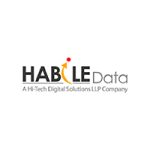
HabileData is a global provider of data management and business process outsourcing solutions, empowering enterprises with over 25 years of industry expertise. Alongside our core offerings - data processing, digitization, and document management - we’re at the forefront of AI enablement services. We support machine learning initiatives through high-quality data annotation, image labeling, and data aggregation, ensuring AI models are trained with precision and scale. From real estate and ITES to retail and Ecommerce, our content reflects real-world knowledge gained from delivering scalable, human-in-the-loop data services to clients worldwide.






